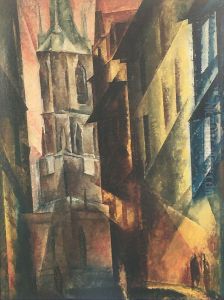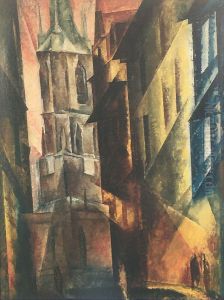Lyonel Feininger Paintings
Lyonel Feininger was a German-American painter, and a leading exponent of Expressionism. He was also involved with the Bauhaus movement as both an artist and a teacher. Born on July 17, 1871, in New York City to a German father and an American mother, Feininger spent his formative years in Europe, primarily in Germany. He began his artistic career as a cartoonist and illustrator, contributing to German and American newspapers.
His style evolved significantly after he became associated with the Berlin Secession group and later with the Blue Rider (Der Blaue Reiter) group, which included artists such as Wassily Kandinsky and Franz Marc. Feininger's work from this period began to show the geometric construction and crystalline structure that would become hallmarks of his mature style. He developed a unique approach to depicting landscapes and urban scenes with a Cubist-inspired method that fragmented forms into transparent, overlapping planes of color.
In 1919, Feininger was invited by Walter Gropius to join the Bauhaus, an avant-garde school of art, architecture, and design, where he taught printmaking and painting. He created woodcuts and other graphic works that became icons of the Bauhaus aesthetic. His involvement with the Bauhaus lasted until its closure by the Nazis in 1933. The political climate in Germany during the rise of National Socialism was hostile to modern art, and Feininger's works were included in the infamous 'Degenerate Art' exhibition in 1937.
As the situation in Germany deteriorated, Feininger returned to the United States in 1937, where he continued to paint and exhibit his work. His later years were marked by a consistent refinement of his style. His compositions from this period often featured maritime scenes and seascapes, reflecting his love for the Baltic Sea, where he had spent many summers. Feininger's legacy includes not only his contributions to painting but also his influence on generations of artists through his teaching at the Bauhaus.
Lyonel Feininger died on January 13, 1956, in New York City. His work is held in major museum collections around the world, including the Museum of Modern Art in New York, the National Gallery of Art in Washington, D.C., and the Bauhaus Archive in Berlin. Feininger is remembered as a significant figure in the development of modern art, bridging the worlds of European avant-garde movements and American modernism.

